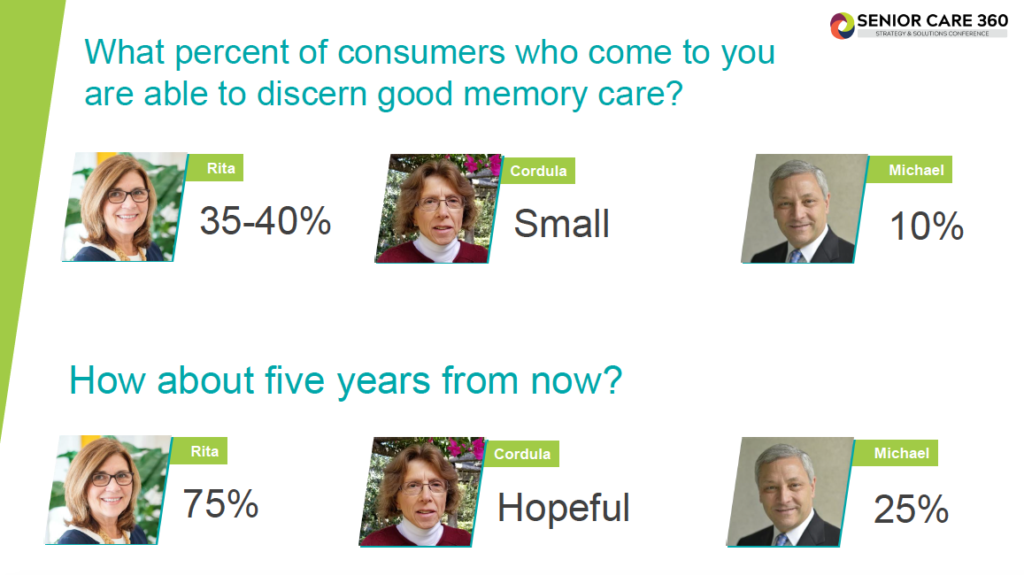While senior living providers are often quick to highlight their memory care services as top-of-the-line, not all of them can back that sentiment up.
All the while, consumers are using social media and online reviews to determine which providers offer quality memory care programming and which do not. Paired with an ongoing and slow recovery for the hard-hit product type, these factors make it imperative that memory care providers not only offer exceptional services, but prove it to consumers, too.
“In this social media, Yelp review era, [you] can’t hide as much behind marketing,” said Lincoln Healthcare Leadership President & Founder David Ellis. “It’s going to come back to quality.”

Ellis on Wednesday moderated a session centered on memory care best practices at this year’s Senior Care 360 event just outside of Washington, D.C. in Maryland’s National Harbor. He was joined by representatives from McLean, Virginia-based Sunrise Senior Living and Nashville-based Abe’s Garden, along with Dr. Cordula Dick-Muehlke, an aging and dementia care psychologist who founded memory care and aging consulting agency Cordula Cares.
The panelists shared five best practices and tips for marketing and running an exceptional memory care program:
No more smokescreens
Prospective memory care residents and their families are often hungry to learn more about Alzheimer’s and dementia. But rampant misconceptions regarding cognitive changes mean they don’t mean they always end up with the facts, and senior living marketers don’t always make it easy to get them.
“We have a lot of smokescreens in memory care … that you have to get behind to know whether something is quality or not,” Dick-Muehlke said.
To that end, providers should staff their communities with knowledgeable employees who can answer questions and walk residents and their families through the process of moving into a memory care community, explained Rita Altman, senior vice president of memory care programs and services with Sunrise Senior Living.
“As the consumers are looking for the right care, they’re coming in and they’ve got to have really knowledgeable sales or marketing teams,” Altman said. “They will also learn a lot from seeing care providers if those providers take the time to develop programs to teach them.”
To achieve that goal, Abe’s Garden has assembled a variety of online resources for consumers and caregivers to learn more about memory care. The provider also has an online guide for prospective residents and their families on evaluating the quality of residential care for people living with dementia.
Sunrise also employs a wide variety of resources to aid prospective residents and their families through the move-in process.
Make philosophy first
An exceptional memory care program usually has an exceptional memory care philosophy behind it.
“If you don’t have a philosophy, you can forget it,” Dick-Muehlke said. “Everybody in the culture has to be embracing this philosophy.”
Memory care providers should train their workers to their standards and keep that philosophy in the front of their minds in the process. Do that, and turnover could fall, Altman said.
“It’s really about getting [caregivers] to make the connection and feel so good and proud that they’ve done it,” Altman said. “When that happens, you keep people.”
Set standards
The industry should also work on setting standards for memory care that prospective residents and their families can use to determine quality operations.
There are already efforts underway to that end, such as the Alzheimer’s Association Dementia Care Provider Roundtable and Argentum’s Memory Care Roundtable.
There are also some measures of quality that currently exist for senior living providers, including J.D. Power’s senior living certification program, which began rolling out earlier this year. Other measures of quality are more granular, and include turnover, retention or resident satisfaction.
Partner with adult day, community groups
Memory care providers should work to gain the trust of adjacent providers in their area, including adult day providers or other organizations that work with older adults who may have Alzheimer’s or dementia. That way, referrals may come easier.
“We have to look beyond the four walls,” Altman said. “With adult day … it’s getting to know [those providers], getting to learn their philosophy, letting them know what we do.”
Borrow from the best
One easy way memory care providers can stand out from the pack is to take stock of others across the U.S. and borrow or adapt successful programming elements, according to Michael Shmerling, Founder and Board Chairman of Abe’s Garden.
The company currently employs a handful of techniques it learned from other providers, such as a storytelling program it adapted from Copper Ridge, an Acts Retirement Life community in Eldersburg, Maryland; or Silverado’s practice of bringing pets into its communities.
“We gather and aggregate best practices of places that are doing well,” Shmerling said. “When we see a great program … we try to bring it in and test it.”
Companies featured in this article:
Abe's Garden, Cordula Cares, Lincoln Healthcare, Sunrise Senior Living

